#Captain Brassbound's Conversion
Text
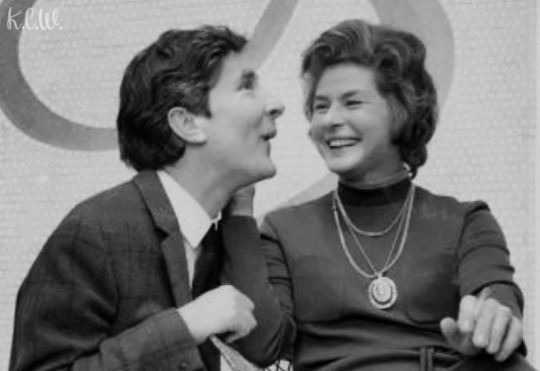
Kenneth Williams and Ingrid Bergman at a press reception in London on the occasion of their upcoming stage play of George Bernard Shaw's "Captain Brassbound's Conversion" on 5 January 1971
24 February 1971
Ingrid is still doing some lines well and some lines badly ... it is because the lack of stage technique makes her her unable to sustain moments or comedy effects ... Nevertheless, I adore this woman and will forgive everything from someone who has her sweetness, radiance and generosity of spirit and who packs the theatre as she does. It is really marvellous to play to such houses.
11 June 1971
[...] I should think Bergman is the best person I've ever met who is an international star. I said to her in the wings 'You are being splendid tonight' & she said 'Yes, I'm in good voice too.' I said 'Yes, but the entrance was superb! So grand, so composed ... utterly serene' and she replied 'Well you know about actors - you can't just switch it on - some nights it all just goes right ...' It is true.
30 August 1982
[...] Went in to see her (Louisa, KW's mother) for meal at 5.30 and she told me 'Poor Ingrid Bergman is dead' and there was an item about her on the TV news, and a shot of her talking about Casablanca. She looked very altered from the '71 days when I worked with her. She died of cancer. [...]
1 September 1982
We saw the television tribute to Ingrid Bergman. It was staggering to see clips of her early films when she looked so radiantly beautiful, and then the later shots of her (during the illness) when the face aged so rapidly. The interviewer asked her 'Were you frightened when you found out you'd got cancer?' and for a tiny moment Ingrid's patience broke. 'Of course ... wouldn't you be frightened if you found that out about yourself?' Then the smile was resumed. I remember that dinner with her at the Garden in '71. I wrote in that diary how I'd said at the end of the evening 'You're the best person I've ever worked with' & she replied 'Oh my dear! There will be lots of others ...' There were not.
The Kenneth Williams Diaries

In memoriam INGRID BERGMAN ✨️
* 29 August 1915
✝︎ 29 August 1982
"You don't realise how much warmth, delight and love you bring into a room with you ..."
#Ingrid Bergman#Happy Birthday angel ✨️🕊#29 August 1915#may she rest in peace 🥀#29 August 1982#Kenneth Williams#The Kenneth Williams Diaries#1971#1982#so sweet how much Ken loved and respected her ... 😭💕#my edits
19 notes
·
View notes
Photo
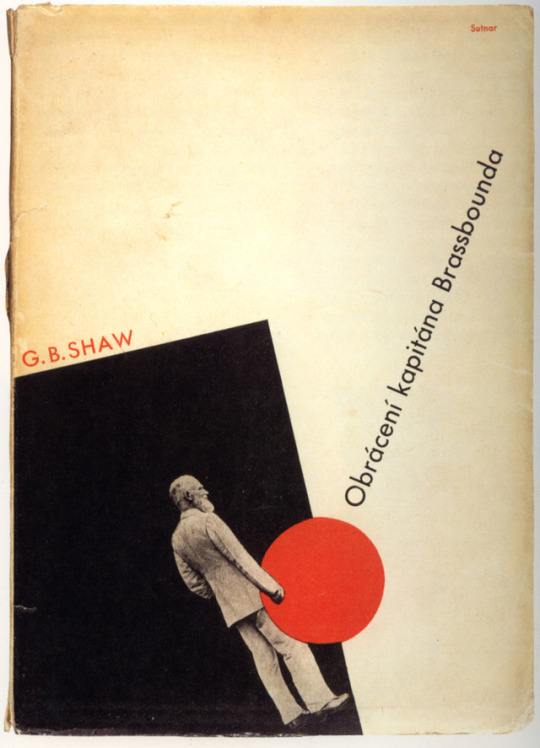
George Bernard Shaw, July 26, 1856 – November 2, 1950.
1932 edition of Captain Brassbound's Conversion (1900). Cover design and typography by Ladislav Sutnar.
25 notes
·
View notes
Text

Ingrid Bergman is introduced to Grace Kelly after the performance of the play “Captain Brassbound’s Conversion of Bernard Shaw” at the Cambridge Theatre in London in 1971.
26 notes
·
View notes
Text


Arrival of Princess Grace and her daughter Princess Caroline to Cambridge Theatre in London on March 18, 1971. They were attending to see Ingried Bergman in the play 'Captain Brassbound's Conversion' witby George Bernard Shaw.
4 notes
·
View notes
Photo
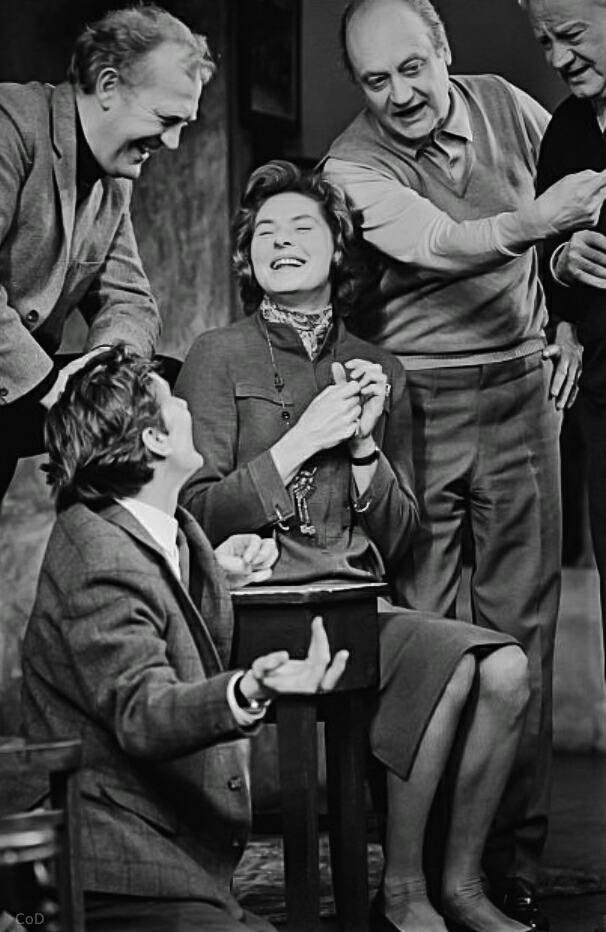
Ingrid Bergman, surrounded by Kenneth Williams (on floor), Joss Ackland, director Frith Banbury and John Robinson, during a rehearsal for George Bernhard Shaw’s play “Captain Brassbound’s Conversion” at Cambridge Theatre in London.
Photo by Jack Kay, 24 January 1971
16 notes
·
View notes
Photo

On 20 March 1936, Robert Cunninghame-Graham, the Scottish nationalist politician and author, died.
The first President of the National Party of Scotland, and first Chairman of the Scottish Parliamentary Labour Party. George Bernard Shaw reputedly used Graham as a model for characters in his plays, Arms and the Man and Captain Brassbound's Conversion. Graham was also a noted traveller, particularly of Central and South America, and wrote extensively of his travels there. He was the first person to be suspended for swearing in The House of Commons, the word was damn! He was jailed for “fighting with police” during a protest.
As an MP among other things he supported the abolition of the House of Lords, universal suffrage, the natiolisation land, mines and other industries, free school meals and of course Scottish Independence.
Read more about this extraordinary man here, you wont be disappointed!
https://www.scotsman.com/lifestyle/the-extraordinary-life-of-the-gaucho-laird-1-465665
10 notes
·
View notes
Text
Letter from George Bernard Shaw to Courtenay Thorpe, 1902
Happy throw back Thursday! George Bernard Shaw, in this letter from the Frances W. and H. Jack Lang Letter Collection, showcases his trademark wit in response to a message he had received from an actress’ agent, Alfred Courtenay. The letter, directed to his friend Courtenay Thorpe, is used by Shaw to express his frustration that Alfred Courtenay had recommended the actress Lillie Langtry for a part in Shaw’s play, ‘Captain Brassbound’s Conversion.’ Shaw had clearly wanted Courtenay’s client, Ellen Terry, for the role. Shaw would eventually get his way when Terry was cast in the American staging of the play in 1907.

Piccards Cottage (10, Adelphi Terrace. W.C.)
St. Catherines, Guildford,
25 March 1902
Courenay’s letter has just come: he wants to put up Brassb. after the run of Mars. Many thanks, confound you!
I feel - well, you know just exactly how I feel. I havnt see her play for some years; and my mind & imagination flatly refuse to contemplate her has Lady C.
I think, on the whole, that I will commit suicide & leave my executors to deal with the matter.
G.B.S.
#George Bernard Shaw#theater history#Lang letters#special collections kelvin smith library autographed letters#throw back thursday
4 notes
·
View notes
Text
Wipers or Vipers 2
Research into the origin and indeed the authenticity of ‘Vipers’ as a slang name for Ypres continues. There are a number of leads and possibilities: was it a mistake; a transcription of a slang German name for the place; a projection by Anglophones of a slang German name for the place; a name marking bitter feelings towards the place; or something else? The appearance of the term in the Publishers’ Circular in 1920 means that this merits a thorough investigation.
Firstly, how did people feel about vipers at the time? There is ample evidence that actual vipers were treated as pests, to be killed. ‘At North Park, Tedburn, recently, Mr W Coldridge killed a viper which measured 2ft 6in. in length. On being opened seven young ones were found inside, as well as a fully grown mouse. The viper is regarded as a very fine specimen’ (Western Times, 9 April 1915, p14). ‘A large snake was found in a farmhouse at Southery Ferry one day last week, and a viper has been killed in the middle of Southery village’ (Thetford and Watton Times and People’s Journal, 20 February 1915, p4). But some documentation reveals some unsureness as to the identity of the animals: ‘Mr F. and his son on one day killed eleven vipers, two snakes, and one adder. On another occasion they destroyed eight vipers and two snakes’ (Exeter and Plymouth Gazette, 30 April 1915, p5).
In this context it is easy to see how the epithet ‘viper’ would be applied to anyone hated, particularly if there was an element of deception involved: thus in Rome the Grand Master of the Freemasons described pacifism as ‘a viper which lay hidden, but whose head must be crushed’ (Dundee Evening Telegraph, 27 November 1917, p1). Turkey, in siding with the Central Powers ‘has acted like a viper to us her old friend and ally’ (Warwick and Warwickshire Advertiser, 13 March 1915, p5). The submarines that sank the Aboukir, the Hogue and the Cressy in September 1914 were described by René Milan as ‘submarine vipers’ (Vagabonds of the Sea, 1919, p48).
‘Viper’ was a straightforward term of abuse against the enemy: a Belgian citizen living in Britain, who took his own life at the beginning of the war, left a note describing the Kaiser as ‘that ferocious human viper of Germany.’ (Newcastle Journal, 2 August 1914, p8). ‘Kaiser-Americans’ were ‘A Nest of Vipers in the States’ (Nottingham Evening Post, 3 August 1915, p3). Following the sinking of the Lusitania, the Dublin Daily Express called for ‘the stamping out of the Prussian vipers or the effective removal of their fangs’ (10 May 1915, p4). German rage against Britain was exemplified in ‘torrents of abuse, floods of fantastic falsehoods, and an ineradicable conviction that the British people are a race of vipers, dastards, bloodsuckers, liars, thieves, murderers, and traitors!’ (Liverpool Echo, 17 January 1917, p3).
British citizens could also be vipers: professional footballers who did not enlist were ‘traitors’ and ‘vipers’. (Manchester Evening News, 7 April 1915, p7). George Lansbury, the socialist politician, condemned the Pall Mall Gazette for describing ‘all those who advocate peace as “vipers”’ (Daily Herald, 3 July 1915, p3). Elsewhere pacifism was equally treated: The critics of Sir Douglas Haig were ‘The Vipers at Work’ – ‘he treated [their] viperous attacks with the contempt they deserved.’ (Globe, 17 December 1918, p2).
Yet the term could also be employed for the animal’s attributes of sudden striking in effective places – in 1899 the Navy’s first turbine destroyer was HMS Viper, though the Navy soon abandoned the use of snake names for ships (though the Western Mail, 11 March 1915, p8, implied that there was a still an HMS Viper in use). Thus ‘viper’ as a term could have useful connotations; but during the war it was generally a negative epithet.
As previously discussed, Ypres occupied a special place in British sentiment, typifying stubborn resistance, loyalty to an ideal, and the projection of these onto a place. But the Ypres League, the Ypres Times, Ypres Day, were post-war constructs. While there is a string tendency to interpret The Wipers Times as lightheartedness in the face of death, it can equally be read as cynical gallows humour, a shout of rage at the futility of the soldier’s situation: there is no love for Ypres in its pages. The patriotic bombast of The War Illustrated might announce that the ashes of Ypres were ‘impregnated with the spirit of Albion’s immortal glory’, but it was still ‘The Dead City’ (p1180, July 1915), a place that ‘smells of lilac and of death’ (S Macnaughtan, A Woman’s Diary of the War, 1915). Already by June 1915 people in Britain were aware that Ypres held a special place of fear for the soldier: David Lloyd George made a speech in Manchester on 3 June, in which he urged the need for greater efficiency in the manufacture of weaponry; particularly the labour force had to work where it was needed, not where it desired, just as was the case for soldiers – ‘The enlisted workman cannot choose his locality of action. He cannot say, “Well, I am quite prepared to fight at Neuve Chapelle, but I won’t fight at Festubert, and I am not going near the place they call ‘Wipers’”’ (The Times, 4 June 1915, p9).
Looking again at the documentation we have for the use of ‘Vipers’ for the place-name, we have the following:
Thanet Advertiser, 23 January 1915, p3, reporting a speech given by a vicar during an evening of talks: ‘Mr Tonks remarked that in connection with this town one was reminded of the optimistic humour of the British “Tommy”. For him, the pronunciation of the town is “Vipers”, and the spirit of lightheartedness revealed by such nick-names must surely assist our men in their struggle for victory.’
The Middlesex Chronicle 26 June 1915, p3: ‘Private E. W. Smith, of Whitton, who writes, under date of June 13th, sends two verses composed by a member of his brigade, … He says “I know those at home are only too delighted to hear and know what ‘Tommy’ sings, even if it only light parody.”
Far far from Ypres (vipers) I long to be.
Where German snipers can’t pot at me.
Think of me crouching where the worms creep
Waiting for something to put me to sleep.
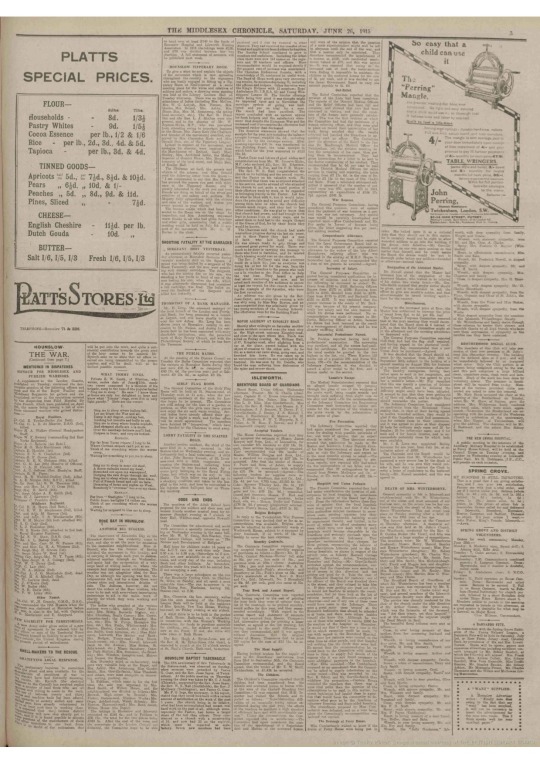
The Manchester Guardian, 29 December 1915, p7: ‘Frenchmen who call Ypres ‘Wipers’. This includes the statement: ‘The gallant army of France has for generations pioneered military progress, yet today the poilu is assimilating British ways and British methods in an extraordinary manner. He is even carrying it to the length of pronunciation. When the French soldier speaks of “Wipers” in the most natural manner imaginable as though he had never called it anything else and sings “Tipperary” as frequently as his own glorious anthem, we may be prepared for anything.’
Imagine how ‘Wipers’ would be pronounced in a French accent: it would probably depend whether the speaker were imitating spoken English, in which case it would be more like ‘ooïpers’, or speaking from the written form, more likely to be ‘vipers’ (as in ‘wagon-lits’).
Evening Despatch, 14 February 1916, p1: a cartoon of German soldiers, with the caption ‘It is stated that German soldiers have a dread of being sent to the Ypres front [see Lloyd George’s speech above]. Some have committed suicide rather than face it. Soldiers’ chorus on being ordered to Ypres :-
O Faderland, my Faderland,
Thy face I never more shall see;
The Englishes at Vipers vos-
Dis is der place for me.
The Publishers’ Circular, 3 January 1920, p7: ‘Ypres, or “Vipers,” as Tommy called it, is a name which will long be remembered by the families of the men from all parts of the Empire who fought and died there. …’
So we see a projection of the term as German pronunciation – critically, no slang name for Ypres in German has been found -, as a projected French pronunciation, one military and two civilian documentations of ‘Vipers’, one of the civilian usages being post-war. There is a possibility that any of the last three were mistakes or individual usages; it is likely that the two civilian usages were acquired from soldiers, the Publishers’ Circular one possibly being from a former soldier. There is also the residence documentation of Private E. W. Smith, Whitton, near Hounslow, now part of Greater London, but then a village to the west of London.
A change of direction: also in the Globe, on 19 January 1916, p2, there appears this:
The “vipers” alluded to in a morning paper as circulating traitorous and disloyal leaflets and circulars must be a kind of pen-viper, as Mr. Sam Weller would say.’ What the writer is alluding to here is the by then centuries-old phenomenon in the London accent of the v/w merger, whereby ‘v’ was pronounced as ‘w’ and vice versa: Sam Weller in Dickens’ The Pickwick Papers is the most well-known exponent of this (“All good feelin’, sir—the wery best intentions, as the gen’l’m’n said ven he run away from his wife ‘cos she seemed unhappy with him”).
There has been considerable argument over the authenticity of this transcribed accent. William Matthews in Cockney Past and Present ([1938] 1972) quotes B Smart (Walker Remodelled, 1836) as saying that it was outmoded in the 1830s, and that A W Tuer, author The Kawkneigh Awlminek (1883), claimed that Weller was ‘exceptional in his pronunciation’ (p180); Ernest Weekley, born in 1865, claimed that though he had heard ‘weal’ for ‘veal’ and ‘wittles’ for ‘victuals’, he had never heard the reverse substitution of ‘v’ for ‘w’. Comedians such as Gus Elen were using the ‘w’ for ‘v’, as in ‘wery good’, well into the 1930s. Peter Wright quotes Henry Wyld as hearing people say ‘vild’ for ‘wild’ as a joky imitation of speech from about 1850 (Wright P, Cockney dialect and slang, London: Batsford, 1981, p137). Supposed to have died out in the nineteenth century, there were remnants of the accent still to be found in the south-east of England: George Bernard Shaw in a note to Captain Brassbound’s Conversion (1900), wrote: “When I came to London in 1876, the Sam Weller dialect had passed away so completely that I should have given it up as a literary fiction if I had not discovered it surviving in a Middlesex village, and heard of it from an Essex one.” Note ‘in a Middlesex village’.
Peter Trudgill in Investigations in Sociohistorical Linguistics (Cambridge, 2010, p65) offers the following: ‘Wakelin [1972: 95-6] writes that the Survey of English Dialects (SED) materials from the 1950s and 60s) show that “in parts of southern England, notably East Anglia and the south-east, initial and medial [v] may appear as [w]’. One of the examples given is ‘viper’. Thus, well into the twentieth century in parts of southeast England ‘viper’ was being pronounced as ‘wiper’.
Now, going back into the nineteenth century, the example frequently given to show the use of this merger of sounds is ‘an old cockney conundrum’ (Wright, p137). This is to be found in Errors of Pronunciation, and Improper Expressions, Used frequently, and chiefly by The Inhabitants of London, published in 1817. On page 34 we find, under V:
V, for W; and W, for V. This error is constantly committed by the vulgar. Veal and Vinegar are by them pronounced Weal and Winegar; whilst, Wine and Wind are sounded Vine and Vind. There is an old cockney conundrum which exemplifies this error:
Why is a pocket-handkerchief like a species of serpent? Answer – Because it’s a viper.
So a) there is anecdotal evidence of the v/w merger surviving in the southeast of England into the twentieth century, often but not always as joke or performance;
b) its exemplary form appears in a joke which specifically mixes ‘wiper’ and ‘viper’;
c) the cockney/London/southeast England accent was recognised as the dominant accent of the British Army on the Western Front: much evidence supports this claim, from ‘Ole Bill to the large number of London street names used as trench names. As an example of how this was translated to the Home Front, the boys’ comic The Dreadnought marked its recognition of the importance of the war to its readers with the announcement, (29 August 1914) 25 days after the declaration of hostilities, that it would be printing a war story every week, followed on 3 October with the beginning of its first war serial, which is centred on the main character of ‘Bill Stubbs, the Cockney Hero’.
Thus it is possible that the use of ‘Vipers’ for ‘Ypres/Wipers’ was an application, self-conscious perhaps, of a vestigial phenomenon in the all important wartime London/southeast England accent.
As a note here, an article in the Sunderland Daily Echo and Shipping Gazette 13 June 1917 (p2), not only indicated that the use of ‘Wipers’ was disappearing, but that it was seen as ‘uneducated’: ‘Now that there are more educated men in the ranks the pronunciation “Wipers” is dying out; in fact it is almost resented’. This is the reverse of what is implied by most of the evidence, that ‘Wipers’ was officers’ pronunciation, and had educated class connotations. ‘Educated’ men may have been more equipped to pronounce Ypres using the French pronunciation, but resentment was more likely to have been at civilians, and especially journalists, using the term.
The three instances, the Thanet Advertiser of January 1915, the Middlesex Chronicle of June 1915, and the Publishers’ Circular of January 1920, are the most noteworthy. The first two document local SE England pronunciation – the Rev Tonks in Thanet may have heard it from a local soldier on leave or convalescing, and though this can never be more than conjecture, he does link it with the well-documented terms ‘Jack Johnson’ and ‘Black Maria’. Recently another instance has emerged in the Publishers’ Circular, in an article published on 25 September 1915 (p271) in a review of S Macnaughtan’s A Woman’s Diary of the War: ‘… relating experiences in Antwerp during the siege, Furnes, the first battle of Ypres – or “Vipers,” as our “Tommies” call it.’ Compare this with the 1920 text: ‘Ypres, or “Vipers,” as Tommy called it’. Close reading of Macnaughtan’s A Woman’s Diary of the War shows there is no instance throughout that book of the use of ‘Wipers’ or ‘Vipers’ or slang names for any Belgian or French towns, though she does self-consciously use slang terms, such as ‘it “bucked one,” as schoolboys say’ (p44) or ‘with “Jack Johnsons” still whizzing overhead’ (p46). So this use of ‘Vipers’ is clearly an inclusion by a Publisher’s Circular editor, quite possibly the same person using a close variation five years later. After reading through every issue of the Publisher’s Circular from August 1914 to July 1916, I think it is unlikely that the source for this usage will appear.
2 notes
·
View notes
Photo

Ellen Terry as Lady Cicely Waynflete in Shaw's Captain Brassbound's Conversion
0 notes
Photo

March 1971, London - Princess Grace of Monaco and Ingrid Bergman visit backstage following Miss Bergman's performance as Lady Cecily Waynflete in George Bernard Shaw's Captain Brassbound’s Conversion at the Cambridge Theatre in London’s West End.
#princess grace of monaco#ingrid bergman#1971#captain brassbound's conversion#grace kelly#george bernard shaw
69 notes
·
View notes
Photo

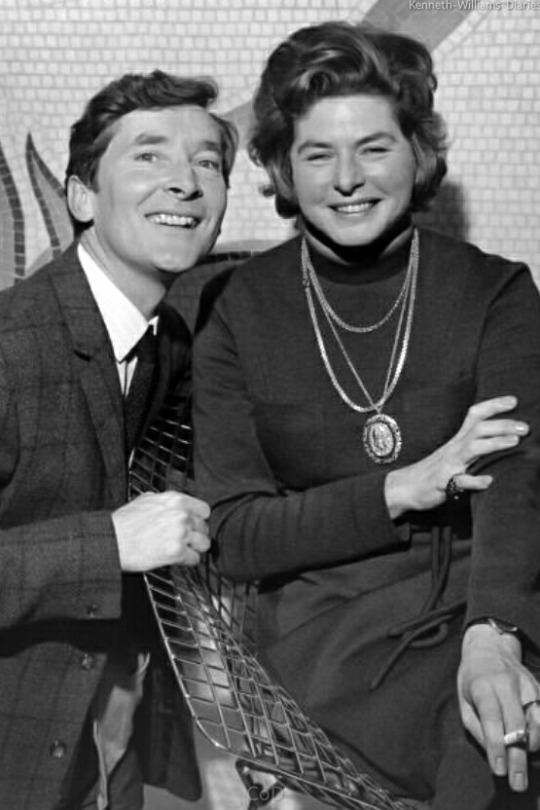
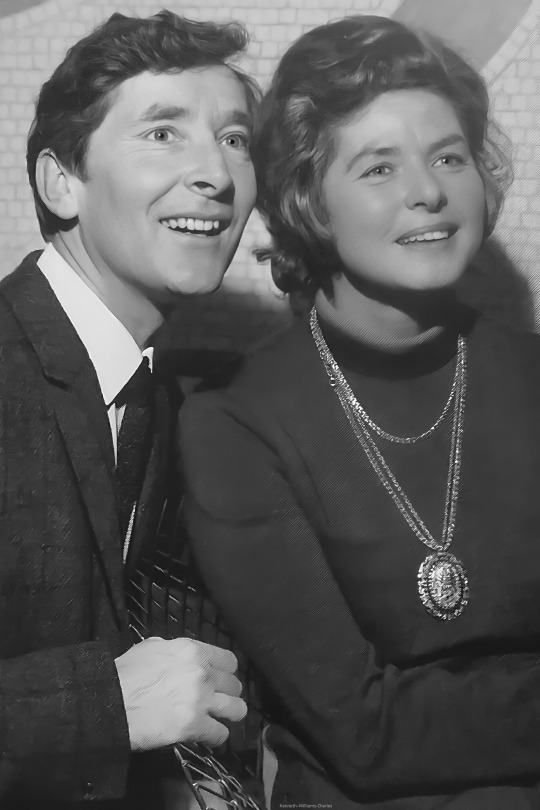

Ingrid Bergman and Kenneth Williams at the press reception for their common stage play, a production of Sir Bernhard Shaw’s “Captain Brassbound’s Conversion” in London, January 1971.
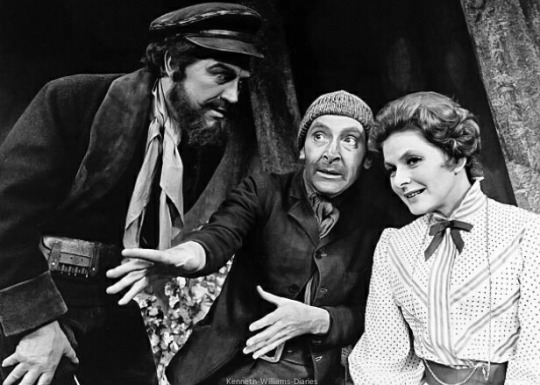
Joss Ackland as Captain Brassbound, Kenneth Williams as Drinkwater and Ingrid Bergman as Lady Cicely Wayneflete on stage.
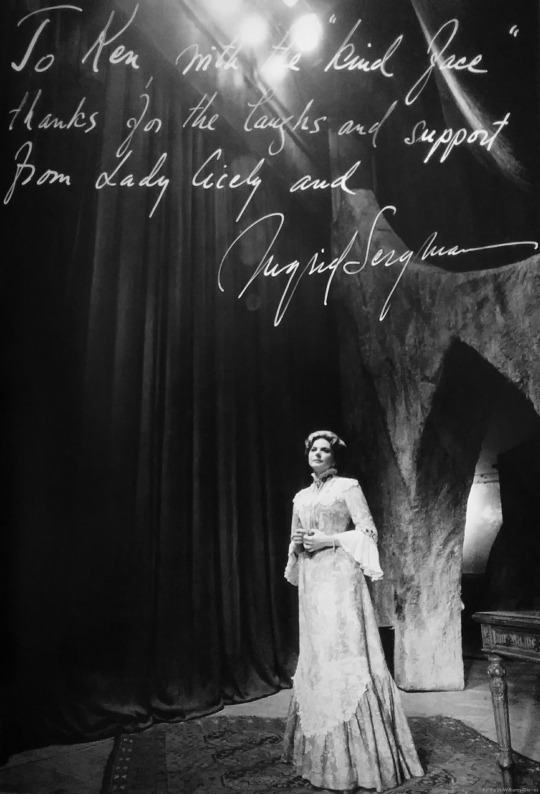
A signed photo from Ingrid, dedicated to Kenneth Williams ♡
‘... you don't realise how much warmth, delight and love
you bring into a room with you ...'
The Kenneth Williams Diaries, May 1971
In loving memory of INGRID BERGMAN დ
* 29 August 1915
✝︎ 29 August 1982
#Ingrid Bergman#birthday tribute#Happy Birthday angel ♡♡♡#29 August 1915 - 29 August 1982#may she rest in peace#Kenneth Williams#Captain Brassbound's Conversion#Sir George Bernard Shaw#stage play#KW stage work#1971#1970s#photo edits#my edits#I would give my left arm for going back in time to see them together on stage!!!!#love them both with all my heart ... 💖
25 notes
·
View notes
Photo

A gorgeous snapshot of KENNETH WILLIAMS and INGRID BERGMAN during the press reception for their common stage play, a production of Sir Bernhard Shaw’s “Captain Brassbound’s Conversion” in London, January 1971.
The play premiered on 1 February 1971 in Brighton, was transferred to several British theatres until 31 July 1971 and at last, broke box office records for a short-run play.
... it must have been amazing to witness these extraordinarily talented artists performing together onstage! ♡
Evening show OK and after!!! - I went up to see Sir Noël Coward in Ingrid's room.
[...] I sat at his feet ... he was adorable and said my performance was very good. 'You are one of the few actors I know who can be outrageous and get away with it ... and we love you for it.'
[...] He looked very good and kissed me on both cheeks with real affection. Impossible to tell him what I really owe him but I did say 'My debt to you is infinite & your dialogue and your lyrics go on delighting me and reverberating thro' me every year ... esp. when I sing "Now In the Clear Bright Morning" [from After the Ball] and he replied 'That's my favourite sentimental lyric' and he said I was clever to remember the words. When he'd gone I said to Ingrid 'It's been a beautiful evening and you have made it all possible ... you don't realise how much warmth, delight and love you bring into a room with you ...' Walked home thanking God for bringing all my dreams to fruition ... couldn't sleep for excitement.
The Kenneth Williams Diaries, May 1971
#oh look at THEM ... so precious!!! 💕#Kenneth Williams#Ingrid Bergman#Captain Brassbound's Conversion#Sir George Bernard Shaw#press reception#press photo#British theatre#KW stage work#London#The Kenneth Williams Diaries#KW in his own words#Sir Noël Coward#1971#1970s#photo edits#KWD edits#I'm in love with this pic ... they're so absolutely gorgeous!!!!! 💗
22 notes
·
View notes
Photo


Ingrid Bergman and Kenneth Williams at a press reception for the play of Sir Bernhard Shaw’s “Captain Brassbound’s Conversion” in London, January 1971
I said to Ingrid … ‘you don’t realise how much warmth, delight and love you bring into a room with you …’
We saw the television tribute to Ingrid Bergman. It was staggering to see clips of her early films when she looked so radiantly beautiful, and then the later shots of her (during the illness) when the face aged so rapidly. The interviewer asked her ‘Were you frightened when you found out you’d got cancer?’ and for a tiny moment Ingrid’s patience broke. ‘Of course … wouldn’t you be frightened if you found out about yourself?’ Then the smile was resumed. I remember that dinner with her at the Garden in ‘71. I wrote in that diary how I’d said at the end of the evening 'You’re the best person I’ve ever worked with’ and she replied 'Oh my dear! There will be lots of others …’ There were not.
1 September 1982
The Kenneth Williams Diaries
Remembering INGRID BERGMAN … 🌹
* 29 August 1915
✝️ 29 August 1982
#Ingrid Bergman#Kenneth Williams#Captain Brassbound's Conversion#press reception#1971#1970s#The Kenneth Williams Diaries#photo edits#29 August#two of my beloved angels ...#may they rest in peace and eternal love!!!!! ♡♡♡#God ... they worked together in the year I was born ...#I was too late 😔!!!!
24 notes
·
View notes
Photo

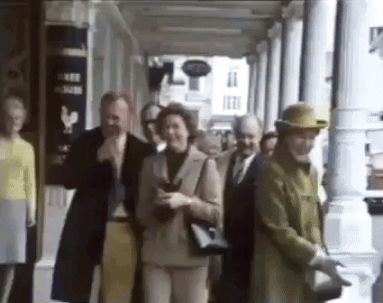

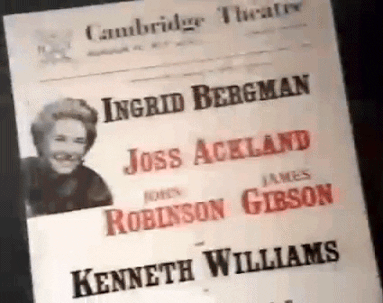
Ingrid Bergman and Kenneth Williams arrive at the Theatre Royal in Brighton, together with Joss Ackland and director Frith Banbury, before the opening of George Bernard Shaw’s “Captain Brassbound’s Conversion”.
The play premiered on 1 February 1971, was transferred to several British theatres until 31 July 1971 and at last, broke box office records for a short-run play.
They opened in Brighton, with Williams in such a raw state of anxiety that he was making mistakes - coming too early on one cue at the dress rehearsal, in front of Beaumont, and missing another altogether on the first night. Bergman chided him, but he felt no anger. She was the one member of the cast whom he liked without reservation. Her fame was so much greater than his that they could never be rivals, and she was earthy and charming. He preserved the card she left in his dressing room before the first night at the Cambridge Theatre in Earlham Street: “Be my next director! Feed out of your hand I would.”
[…]
She had the gift to make him feel, with a look or a few words, as if he was her cornerstone, the true friend whose talent kept her world intact. She was never precious, and she did not pretend to be a great actress, but her sincerity made a word of praise seem worth more than all the critics’ specious columns. Everyone felt this magic. One evening, Bergman invited Williams to supper, with Binkie Beaumont and Clive Dennis, whose pop-star looks pleased the impresario. She served vodka and Swedish meatballs.
“I ADORE this woman,” wrote Williams, despite her stumbles and lack of stagecraft, “and will forgive everything from someone who has her sweetness, radiance and generosity of spirit AND WHO PACKS the house as she does.”
Excerpts from “Born Brilliant - The Life of Kenneth Williams” by Christopher Stevens
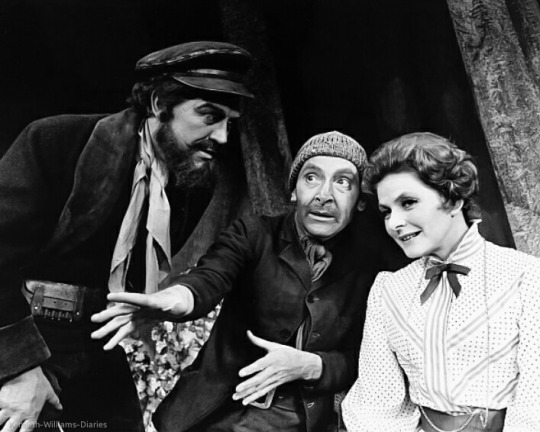
On stage: Joss Ackland as ‘Captain Brassbound’, Kenneth Williams as ‘Drinkwater’ and Ingrid Bergman as 'Lady Cicely Waynflete’
#Kenneth Williams#Ingrid Bergman#Joss Ackland#Captain Brassbound's Conversion#George Bernard Shaw#stage play#Born Brilliant#Christopher Stevens#book excerpts#KW stage work#1971#1970s#gif edits#photo edits#I wish I could have seen these precious people performing on stage together!!! 😭
14 notes
·
View notes
Photo

Another adorable snap shot of Kenneth Williams and Ingrid Bergman at a press reception at the Cavendish Hotel on January 5, 1971.
These two lovelies tread the boards together in George Bernard Shaw’s “Captain Brassbound’s Conversion”.
The play opened on 1 February 1971 in Brighton and was later transferred to London’s Cambridge Theatre, last performance on 31 July 1971.
The play started its London run at the Cambridge Theatre on the 18th of February.
I wrote in my diary, ‘The performance went reasonably competently and at the end there were nine curtains for the company and Ingrid had to take three solo calls because the house obviously adored her.’
The critics were either cruel or cool but certainly not enthusiastic. It counted for nothing because the advance bookings were overwhelming and we played to packed houses for the limited six-month run. There were nights when Ingrid was on form and there were nights when she was tired and didn’t adhere to the text. All her film experience never supplied the technique for a sustained performance eight times a week, but that didn’t really matter.
The reception she received night after night proved that the audience hadn’t come to see Bernard Shaw’s Lady Cicely Wayneflete: they’d come for the magic of Ingrid Bergman and an aura which criticism, good or bad, could do nothing to dispel.
from “Just Williams - An Autobiography” by Kenneth Williams (1985)
#Kenneth Williams#Ingrid Bergman#Captain's Brassbound Conversation#George Bernard Shaw#1971#1970s#photo edits#Just Williams#1985#KW stage work#KW in his own words#I'd give my right arm ...#for going back in time and watch THEM on stage!!!!!!!!!#born in 1971 ... too late tho' 😭😭😭
22 notes
·
View notes
Photo

To Ken, with the "kind face" ... thanks for the laughs and support from Lady Cicely and Ingrid Bergman
Kenneth Williams (as Drinkwater) and Ingrid Bergman (as Lady Cicely Waynflete) played together in Sir Bernard Shaw's "Captain Brassbound's Conversion". It ran from February to July 1971 and broke UK box-office records for a short-run play.
Had to go to Ingrid for an autograph for Perihan and she sweetly wrote 'From her uncle's leading lady ..." I should think Bergman is the best person I've ever met who is an International Star. I said to her in the wings 'You are being splendid tonight' and she said 'Yes, I'm in good voice too.' I said 'Yes, but the entrance was superb! So grand, so composed ... utterly serene' and she replied 'Well you know about actors - you can't just switch it on - some nights it all just goes right ...' It is true.
- The Kenneth Williams Diaries, 11 June 1971
#Ingrid Bergman#dedicated autograph#Kenneth Williams#KW private archive#KW stage work#Captain's Brassbound Conversation#George Bernard Shaw#The Kenneth Williams Diaries#1971#1970s#photo edits#this is so lovely ... I could cry!!!!!!#♡♡♡
5 notes
·
View notes